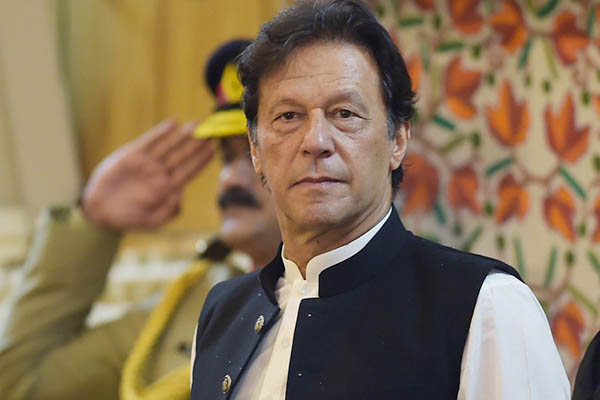
File photo of Prime Minister Imran Khan. Aamir Qureshi—AFP
In separate meetings, Pakistan’s prime minister seeks more exports, stresses religious scholars have ‘vital’ role to play in achieving welfare state
Prime Minister Imran Khan on Thursday said that reforming Pakistan’s criminal justice system was among his government’s top priorities, adding that the prevailing situation encourages crime and prevents the common man from availing justice.
Addressing the launch of Letters of Administration and Succession Certificates, he claimed that crime rates would falls once all culprits started facing punishments for their crimes. “A civilized society gives a message: Crime does not pay,” he said. Claiming he only considered a reform beneficial if it helped the common man, he said the law ministry’s latest initiative would reduce citizens’ concerns.
Inheritance certificates would now be issued within 15 days, he said, noting that long delays in the process had resulted in land mafias seizing properties, especially of overseas Pakistanis. He said around half of all pending cases in courts were related to land disputes, adding the new certification process would help curtail this.
Reiterating his resolve to transform Pakistan into Riyasat-e-Madina, he said the Muslim state had been based on the principles of equality and justice. “Any system that denies the spirit of facilitation to the general public in fact encourages criminal activities in the shape of bribery or illegal occupation of property. When crime pays, crime multiplies,” he added.
Under The Letters of Administration and Succession Certificates Act, 2020, the Law Ministry would establish Succession Facilitation Units in collaboration with the National Database and Registration Authority for the issuance of letters of administration and inheritance certificates within 15 days of initiation of the application by the legal heirs of the deceased. Previously, it could take two to seven years for a simple succession certificate to be issued.
Islamic welfare state
In a separate meeting with a delegation of religious scholars in Islamabad, Khan urged them to cooperate with the government to thwart conspiracies seeking to sow discord in the Muslim Ummah. He stressed that religious scholars had a pivotal role to play in transforming Pakistan into an Islamic welfare state.
Commending the ulema’s efforts to counter sectarianism and extremism, the prime minister said the incumbent government wanted to continue seeking their guidance to address all the challenges faced by the country.
The religious scholars in attendance appreciated Khan for representing the sentiments of Pakistanis and the entire Muslim ummah on a global state, emphasizing his stance on the threat posed by Islamophobia. They also hailed his assertions on Pakistan not recognizing Israel until the rights of Palestinians had been ensured.
Referring to the prime minister’s vision of a Riyasat-e-Madina in Pakistan, they assured him of their full support and appreciated the government’s efforts to improve madrassas, including by introducing new curriculum as per modern day requirements.
The ulema also commended the government’s efforts to protect minorities, claiming minorities felt safer in Pakistan than they did in India.
Priority sectors
Also on Thursday, the prime minister chaired a weekly review meeting of priority sectors and directed officials concerned to take all necessary measures to increase exports on priority. He called for the formulation of a comprehensive action plan to increase the exports of valuable items.
The prime minister also chaired a meeting on Pakistan’s agriculture sector, during which he was briefed on the progress of the Food Security Dashboard set up in collaboration with the Sustainable Development Policy Institute. Khan was informed that the capacity of relevant departments was being enhanced to compile data for decision-making. He directed authorities concerned to strictly monitor sugar sales and obtain information from flour mills to get accurate data.
